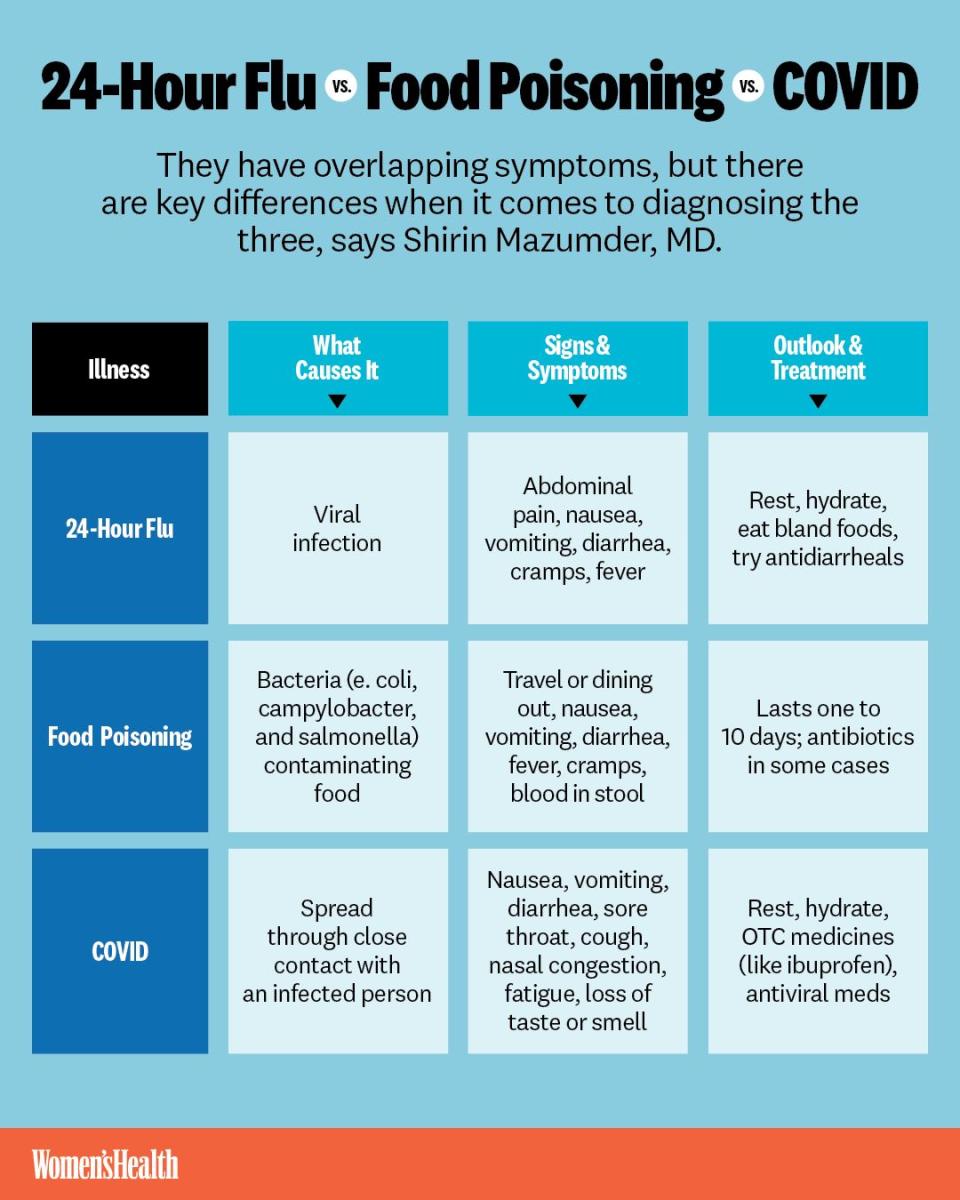The 24-Hour Flu Is A Misnomer And It Has Nothing To Do With The Flu

"Hearst Magazines and Yahoo may earn commission or revenue on some items through these links."
No one ever wants to get sick, but in the era of the tripledemic (when RSV, flu, and COVID-19 peak at the same time) you’re likely doing everything in your power to stay healthy. But there’s unfortunately another not-so–fun illness that should be on your radar with the holiday season and winter travel in full-swing: the 24-hour flu.
Believe it or not, even though it's called "the 24-hour flu," it has nothing to do with the flu or flu virus at all (kinda like the period flu). The 24-hour flu is a misnomer because influenza is an upper respiratory tract virus that does not involve the gastrointestinal tract, explains Nicholaos Bellos, MD, an infectious disease expert and the national medical director of extended care services at Quest Diagnostics.
People who have the 24-hour flu are actually experiencing a condition known as gastroenteritis, also often referred to as the stomach flu, he says. Gastroenteritis is commonly known as the 24-hour flu because the symptoms it causes may only last a day or two. That's not always true, though, since GI issues caused by this condition can sometimes take up to 14 days to go away, notes Dr. Bellos.
When it comes to the 24-hour flu, you don’t want to mess around. Below, read on to learn everything you need to know about this stomach bug, and how to treat it, according to doctors.
Meet the experts: Nicholaos Bellos, MD, is an infectious disease expert in Dallas, Texas and the national medical director of extended care services at Quest Diagnostics. Natasha Chhabra, MD, is a gastroenterologist in Ridgewood, New Jersey at Gastroenterology Associates of New Jersey. Shirin Mazumder, MD, is an infectious disease physician at Methodist Le Bonheur Healthcare in Memphis, Tennessee.
What causes the 24-hour flu?
“Adult cases are usually caused by norovirus, also known as the winter vomiting bug, rotavirus, or food poisoning,” says Dr. Bellos. The virus or contaminated food causes your stomach and intestines to become irritated and inflamed, leading to gastroenteritis and the associated symptoms, he explains.
Both the norovirus and rotavirus are spread through coming into contact with someone who has the virus or their unwashed hands (especially after going to the bathroom or changing a diaper) or touching contaminated surfaces. Food poisoning, on the other hand, occurs when someone consumes contaminated food or water, notes Dr. Bellos.
That said, the 24-hour flu is typically not airborne (caused by coughing, sneezing, or laughing), says Natasha Chhabra, MD, a gastroenterologist at Gastroenterology Associates of New Jersey. “People can get it through ingestion of contaminated foods, but usually more rapid spread is in crowded areas and more through direct contact rather than respiratory.”
“The 24-hour flu is very contagious which usually means if one member of your household becomes ill, then other members are at high risk of becoming sick too,” adds Shirin Mazumder, MD, an infectious disease physician at Methodist Le Bonheur Healthcare in Memphis, Tennessee.
What are the symptoms of the 24-hour flu?
Symptoms usually appear within four to 48 hours after coming in contact with the virus or eating contaminated foods. They can include abdominal pain, diarrhea, cramps, nausea, vomiting, and sometimes fever, says Dr. Bellos. You may also have body aches, loss of appetite, or extreme fatigue, and dehydration is common if you're throwing up or going to the bathroom a lot.
The tricky part is symptoms can be similar to those of the flu or COVID-19. “COVID-19 can cause gastrointestinal symptoms, even when breathing problems are not present, so it’s important to look at other more severe health conditions when experiencing symptoms,” says Dr. Bellos. But simple tests can rule out COVID-19, the flu, or bacterial infections.
And while *anyone* can get the 24-hour flu, those with a weakened immune system are at a higher risk, notes Dr. Chhabra. Young children, elderly people, and anyone who is immunocompromised or taking medications that suppress their immune system are more likely to develop severe symptoms.
Does the 24-hour flu really go away in a day?
Unfortunately, no. “For most people, the illness goes away in a few days, and you can be contagious from a few days to two weeks or more, depending on which virus caused the gastroenteritis,” says Dr. Bellos. However, in the case of the norovirus, you may still be contagious a few days after you recover.
We repeat: The 24-hour flu is very contagious, so the best way to avoid getting others sick is to limit contact, disinfect all surfaces (counters, door handles, faucets, etc.), and practice good hand washing (that means rinsing with soap and water for at least 20 seconds), says Dr. Bellos. The virus can also remain in your stool for up to two weeks after recovery, so hand washing after using the bathroom is absolutely essential, he adds. You should also avoid sharing personal items such as utensils, glasses, plates, and towels with anyone who is sick, explains Dr. Mazumder.
Is the stomach bug actually the flu?
Again, the name ‘24-hour flu’ is misleading because the illness is not the flu at all, says Dr. Mazumder. “The flu is caused by the influenza virus, which most commonly leads to a respiratory illness, and the 24-hour flu can be caused by different viruses which lead to gastroenteritis or inflammation of the digestive tract, which decreases the body’s ability to absorb and digest food,” she explains. Norovirus most often affects adults and rotavirus is the most common cause in children under two, she adds.
How do you treat the 24-hour flu?
Most cases go away on their own with lots of rest and plenty of fluids, and Dr. Mazumder recommends hydrating with water and Pedialyte. “The main complication of the 24-hour flu is dehydration, but avoid hydrating with energy drinks or other sugary beverages because sometimes the sugar in these beverages can cause a worsening of symptoms,” she explains.
If you’re struggling to keep anything down, drink small amounts (two to four ounces) every 30 to 60 minutes, adds Dr. Bellos. You should also stick to bland foods like bread, crackers, rice, bananas, or applesauce, and avoid anything heavy or flavorful, adds Dr. Mazumder.
“Sometimes antidiarrheals like Imodium can be used, but that should be discussed with your doctor before using in case there is an infection that requires more specific treatment like an antibiotic,” says Dr. Chhabra.
A probiotic supplement may also be helpful to restore the gut flora, which can be thrown off when you’re dealing with an infection or virus. “There's not one probiotic that’s considered much better than others, but a probiotic in general supplies you with good bacteria and can help mitigate symptoms,” adds Dr. Chhabra. You may not feel the effects of the probiotic right away, but you’ll notice (and feel!) a difference over time.
When should you see a doctor?
If you have diarrhea that lasts more than several days or notice blood in your stool, then you need to seek medical care, says Dr. Chhabra. Prolonged nausea that lasts more than one to two weeks is also a sign that it’s time to check in with your doc.
Dehydration is another major concern with the 24-hour flu, so if you feel lightheaded, dizzy, delirious, or have dry mouth, lips, or eyes, then you need to go to the emergency room or urgent care ASAP, says Dr. Chhabra. It’s also especially important to watch for symptoms of dehydration in the elderly, children, and people with a weakened immune system, adds Dr. Mazumder.
How is the 24-hour flu diagnosed?
The 24-hour flu is usually diagnosed by symptoms and circumstances alone, says Dr. Mazumder. For example, if the sickness spreads through your family or household, it’s likely a virus. Testing is usually not necessary if symptoms only last a few days, but a stool test may be required if you have severe or prolonged symptoms, she adds.
24-Hour Flu Vs. Food Poisoning Vs. COVID-19
The 24-hour flu, food poisoning, and COVID-19 all have overlapping symptoms such as nausea, vomiting, and diarrhea, but there are some key differences when it comes to diagnosing the three, says Dr. Mazumder.

Food poisoning is caused by bacteria such as e. coli, campylobacter, and salmonella, which can contaminate food products, says Dr. Mazumder. “Food poisoning is suspected if you have eaten out or traveled recently, and symptoms can start within hours of exposure,” she explains. Stomach upset, nausea, vomiting, diarrhea, fever, and cramps are common symptoms, but blood in your stool can also occur and should warrant an urgent medical evaluation, she adds. Food poisoning usually lasts anywhere from one to 10 days and antibiotics may be necessary in severe cases or in those with a higher risk of complications, notes Dr. Mazumder.
COVID-19 is caused by the SARS-CoV-2 virus and is typically spread through close contact with an infected person. Nausea, vomiting, and diarrhea are frequent COVID-19 symptoms, but sore throat, cough, nasal congestion, fatigue, and a loss of taste or smell can also develop, says Dr. Mazumder. A home test can be helpful to determine if COVID-19 is at play, but a PCR test at your local clinic can also (more accurately) detect the virus, she explains. If you test positive for COVID-19, isolate yourself from others for at least five days, and continue wearing a mask around others, especially if they are high risk, for an additional five days, per the Centers for Disease Control and Prevention. Treatment typically consists of rest, hydration, and over-the-counter medicines like ibuprofen, but antiviral medications can be used to treat mild to moderate cases if someone is at high risk for complications, adds Dr. Mazumder. Unlike food poisoning, there is also a vaccine available to prevent COVID-19 and serious illness, she adds.
Symptoms of norovirus or rotavirus typically start anywhere from one to three days after exposure, says Dr. Mazumder. Symptoms include abdominal pain, nausea, vomiting, diarrhea, cramps, and fever, and typically last a few days, but can last up to two weeks, she explains. Since the 24-hour flu is caused by a viral infection, Dr. Mazumder says antibiotics won’t work to treat this kind of infection, but rest, plenty of fluids, bland foods, and antidiarrheals can help ease symptoms.
Bottom line: The 24-hour flu typically lasts longer than a day and causes abdominal pain, cramps, nausea, diarrhea, and vomiting. If you become sick, get plenty of rest and stay hydrated, but if symptoms worsen or persist longer a week, or you have blood in your stool, visit a doctor ASAP.
You Might Also Like

